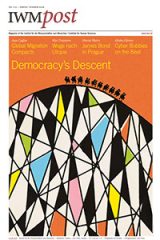

In collaboration with
Institute for Human Sciences
The Institute for Human Sciences / Institut für die Wissenschaften vom Menschen (IWM) is an independent institute for advanced study in the humanities and social sciences. Since its foundation in 1982, it has hosted more than 1500 scholars, journalists and translators from all over the world. Many of the Institute’s Permanent and Visiting Fellows are regular contributors to Eurozine or its focal points The World in Pieces and Ukraine in European Dialogue (see below).
Website: www.iwm.at
X (formerly known as Twitter): https://x.com/iwm_vienna
Youtube: https://www.youtube.com/channel/UCIwFQ_iRX8w8D0NKJo41Ihw

Articles
Anatomy of a crisis
The referendum and the dilemmas of the enlarged EU
The rejection of the European Constitution by French and Dutch voters in 2005 evoked fears of dilution and fragmentation of the EU as a result of increasing decentralisation. In the worst-case scenario, Europe would be divided and increasingly unstable, ruled by a wide range of ad hoc coalitions but devoid of any real plan. A more reassuring view holds that the EU has finally got rid of the myth of political union, the age-old chimera for European federalists. Jacques Rupnik analyses the underlying factors and possible consequences of the crisis of the European project.
A "pause for thought" without the thought?
Possible ways to talk about the future of the EU today
After the rejection of the EU constitution in the French and Dutch referenda, Europe’s elites launched a one-year “pause for thought” in the ratification process. A summit in June 2006 brought an extension of the adjournment. The time could be put to good use, writes political scientist Jan-Werner Müller. Theoretically speaking, there are three Euro-visions currently competing; a discussion of their pros and cons would be well worth Europeans’ while.
Since the Kaczynski brothers’ political ascendancy at the head of the Law and Justice Party (PiS), there has been a string of developments that have alarmed Poland’s EU fellow-members: the election of a civil rights spokesperson who openly advocates the death penalty; plans to close down the body that monitors the independence of the media; a law drafted that would abolish the autonomy of the civil service, to name but a few. To understand how this situation arose, one needs to look more closely at the period of change in Poland since 1989. The “radical” government stems from that section of the Solidarity movement opposed to the route transformation took; for the radicals, the reckoning with the ancien regime has been insufficient, leading to a system they view as a pathological symbiosis of communism and capitalism, democracy and a post-communist mafia. The cultural traditionalism of the PiS, writes Smolar, has landed on fertile ground in a contemporary Poland suffering from social alienation, distrust in democratic institutions, high unemployment, and growing income discrepancies.
Erzwungene Wege [“Forced journeys”] is the title of the newly opened exhibition at the German Historical Museum in Berlin on the history of forced migration in Europe. It has been organized by the German League of Expellees, which represents Germans forced to migrate after WWII, and is a step towards the League’s goal to set up a permanent exhibition in the German capital. The exhibition has been the source of ongoing diplomatic conflict between Germany and its eastern neighbours – above all Poland – since the League called on Poland to pay compensation to former German owners of Polish property and even opposed Poland’s accession to the EU. Philipp Ther outlines the background of the historical conflict between Germany and Poland, the reasons behind the paradigm shift from culprit to victim in the German view of its history, and the enduring and very different memory in Poland of the German occupation.
Focal points

Inspired by a lecture that Clifford Geertz delivered in 1995 at the Institute for Human Sciences in Vienna, this focal point engages with ‘deep diversity’, ‘a sense of dispersion, of particularity, of complexity and of uncenteredness’ rather than unified world order. It follows the launch of a research programme of the same name at the institute in January 2023.

Post-revolutionary Ukrainian society displays a unique mix of hope, enthusiasm, social creativity, collective trauma of war, radicalism and disillusionment. With the Maidan becoming history, the focal point ‘Ukraine in European Dialogue’ explores the new challenges facing the young democracy, its place in Europe, and the lessons it might offer for the future of the European project.
Projects and publications

